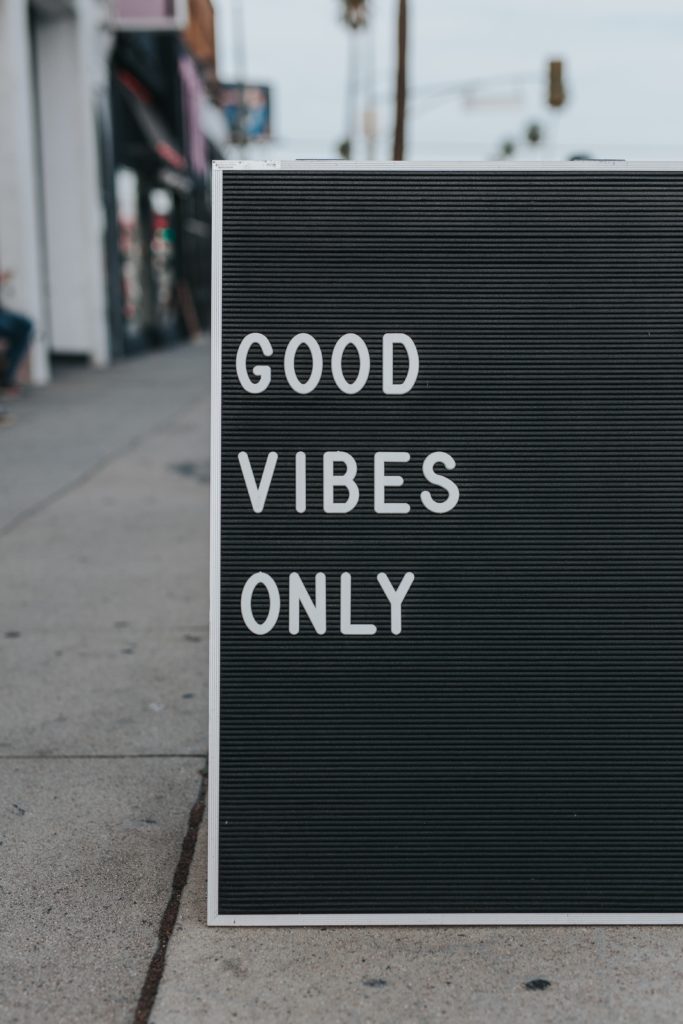
Is too much of a good thing possible? In a word, yes. Even looking on the bright side can become bad for your health and wellbeing if you use it as a way to escape your problems. It’s called toxic positivity, and while it’s been around for a long time, our online culture is bringing it into our lives 24/7.
Floating on Cloud 9 may seem ideal, but after a while, the air is going to get thin. That’s why it’s important to know how to spot this detrimental habit and prevent yourself from overdosing on the sunshine and rainbows.
What is toxic positivity?
Let’s start by saying that there is nothing wrong with wanting a calm, supportive environment. I certainly love a good pep talk from my girlfriends after I’ve flubbed an audition or lost out on a big role. And I absolutely believe that we can manifest good things in our life by maintaining a positive outlook.
You also need to embrace reality, where you are at right now, before you can move forward.
Popularized by psychotherapist and IG superstar Whitney Goodman, toxic positivity is like looking through rose colored glasses you never take off. It occurs when you are so determined to look on the bright side that you begin to deny any negative emotions that you or someone else may be feeling.
In the second season of HBO’s popular show Euphoria, the character of Kat (played by Barbie Ferreira) experiences toxic positivity in a very visual way. Kat’s in bed, depressed and feeling like shit, as various online influencers appear as visions around her, berating her and telling her to “just love yourself.”
Can we talk about Kat’s ‘love yourself’ social media culture scene in the new Euphoria episode. Shit was powerful. pic.twitter.com/YCgAHsN5F1
— femme fatale 2.0 (@eliesaaabs) January 17, 2022
This scene is a great example of how toxic positivity is a dysfunctional approach to dealing with your problems. Goodman explains, “The core of toxic positivity is that it’s dismissive and it shuts down the conversation… It effectively says, ‘Nope, that feeling you’re experiencing, it’s wrong — and here’s why you should be happy instead.’”
Why is it so bad for us?
Sadness, anger, hurt, frustration, disappointment, and doubt are all part of the human experience. When you invalidate or bottle up negative feelings, you begin creating the perfect environment for an explosion or a breakdown (or both).
In addition, toxic positivity causes us to feel guilty about having emotions at all. It shames us for having negative emotions and then shames us if our positive emotions aren’t happy enough. That’s a no win situation that could prevent people from seeking out the support they may desperately need. Which is a literal shame, because being able to handle our own complex and heavy emotions actually allows us to help others through similar circumstances.
When you’re able to process and manage difficult emotions, you strengthen your resilience. This can be especially helpful as an actor, not only because we feel so many emotions for a living but because the industry can be so emotionally taxing.
(Resilience is a skill you can nurture just like any other. If you want to explore ways to toughen up your mental know-how, here are 6 ideas to get you started building your resilience.)
Now, you know I love expressing gratitude daily, but it can also be wielded as a weapon of toxic positivity. Have you ever shared how bad you’re feeling and someone responds with, “You should count your blessings,” or, “Well, at least you don’t have it as bad as so-and-so…”?
Licensed therapist Jody Kemmerer, LCSW says this kind of veiled admonishment is common, but that true gratitude only comes after you get honest with yourself: “In my work as a psychotherapist, I’ve noticed that gratitude actually comes after a process of surrendering to our painful emotions, not after willing in something positive.” You just can’t fake being thankful and expect to reap the mental benefits.
How can we learn to sit with uncomfortable feelings?
As toxic positivity permeates our culture more, here are a few ways you can learn to sit with your uncomfortable feelings without getting overwhelmed.
1) Practice mindfulness.
Being present will help you to notice when you’re exhibiting toxic positivity towards yourself or others. Then you can acknowledge the uncomfortable or negative feelings in order to move through them. It may even be helpful to say to yourself, “Oh, here comes self-doubt. Oh, this is sadness. Oh, looks like I’m a little angry.”
2) Release judgment.
You are allowed to have a bad day (or week) and feel crappy. Even when we’re in wonderful relationships or working an absolute dream job, it’s unrealistic to think every moment will pass smoothly. There are bound to be bumps in the road, but that doesn’t necessarily reflect your overall experience.
In addition, when dealing with a toxically positive person, resist the urge to correct their behavior. Instead, redirect the conversation with this tip from Goodman: “…acknowledge their wish to be helpful, and then say something like, ‘What I would really like is this.’
If you need extra guidance, check out this Self-Forgiveness and Judgment Detox.

3) Stop categorizing emotions as good or bad.
Like everything in life, emotions exist in a gray area. Typical “bad” emotions like sadness, fear or anger are, according to Goodman, “part of a biological mechanism that helps you identify things that are threatening, upsetting, or need attention, like a blinking “check engine” light.” So they can serve a “good” purpose.
Instead, understand that some emotions simply require more time to work through them than others. The experience may be tedious or distressing, but that doesn’t mean it’s a bad thing.
4) Journal to reveal any hidden feelings.
Sometimes, we just can’t express what we’re dealing with aloud, or we don’t realize we’re pushing feelings aside until we see the big picture. In order to improve your awareness and confidence, try journaling every day for at least five minutes.
For example, maybe you’re overly optimistic about your relationship with your agent, but after seeing pages and pages of moments where your voice wasn’t being heard or they didn’t follow through, you can no longer ignore there is a disconnect.
Have you dealt with toxic positivity before? What were some actions you took to address and accept your uncomfortable emotions? Let me know in the comments below.
LOVE + acceptance!




+ show Comments
- Hide Comments
add a comment